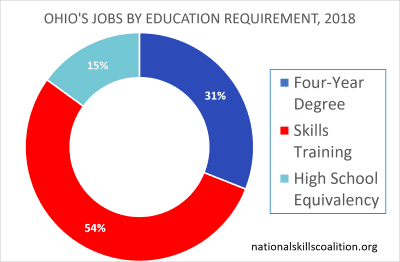The Literacy Cooperative’s Call to Employers – Advancing Literacy is Key to Advancing the Workforce
Integrating literacy and numeracy into job training may be the key to advancing literacy in Cuyahoga County, according to a recent report by The Literacy Cooperative.
Today’s job market is changing rapidly, and the ways in which workers adapted their skills in the past are unlikely to be as effective now due to the quickly evolving nature of work and the increased productivity, technology, and flexibility required in most jobs.
Over half of in-demand jobs in Ohio require skills training beyond high school, but not a four-year degree. Even with access to training, adults may struggle due to less than proficient literacy and numeracy skills, also known as foundational basic skills.
The Literacy Cooperative (TLC) writes that while workers struggling with literacy and numeracy may have learned how to adapt to their duties, they may be unable to advance in their careers when more complex responsibilities and skill-building are required. Additionally, due to stigma, individuals with low literacy and numeracy may be less likely to disclose that information and find appropriate help.
Contextualized learning involves integrating literacy and numeracy skills into training for in-demand industries. This could be a curriculum that teaches carpenters how to make precise measurements, bank tellers the customer service skills they needed to explain new financial services to customers, or production workers how to interpret the statistics issued by computerized equipment.
An example of contextualized learning is TLC’s contextualized curriculum, which focuses on the skills identified as necessary for the responsibilities of specific jobs.
According to Laurie Atkins, VP of Strategic Initiatives, this method has been linked to clear, tangible, more immediate results in job performance and job prospects.
“Learners are more likely to see the relevance and thereby master those skills more quickly and retain and develop them more fully,” she said.
Adults are statistically more likely to increase their skills and advance in their careers when job training includes contextualized curriculum. Research shows that even small advances in foundational basic skills can be a great advantage for workers transitioning into more skill-demanding opportunities. Since low literacy can affect safety, productivity, customer service, and employee morale, employers investing in advancing both the literacy and job skills of their employees can reduce loss, increase profit, and have a better trained, more retainable, and more productive workforce.

